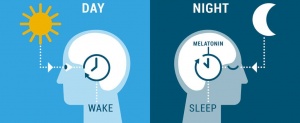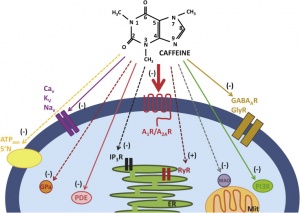Overview of the circadian rhythm

The circadian rhythm regulation plays a crucial role in people’s healthy lives affected by factors consisting of cosmic events related to the universe and earth, environmental factors, and lifestyles. The circadian rhythm is affected by the circadian clock, which is an internal regulator in cells of organisms, coordinates physiological and behavioral activities with daily environmental variations within 24-hour cycles (Charrier et al., 2017). That’s just a quick explanation of the circadian rhythm but how does adenosine affect this.
Adenosine overview
Adenosine is linked to metabolism of cells. In the central nervous system, an increase in neuronal activity enhances energy consumption as well as extracellular adenosine concentrations. In the brain, adenosine antagonists affects A1 receptors which decreases neuronal activity which is why you have more energy (Porkka- Heiskanen et al., 2002).
Adenosine and sleep

Out of the many articles I have been reading it seems like the main area of adenosine activity is the cholinergic basal forebrain. It is important in this function because it is an essential area for mediating the sleep-inducing effects of adenosine by inhibition of wake-promoting neurons via the A1 receptor (Basheer et al., 2004). Their evidence finds that a cascade of signal transduction induced in A1 receptor activation in cholinergic neurons leads to increased transcription of the A1 receptor. They believe that this is the reason behind sleep-deprivation.
Coffee and sleep

The information I found on the effects of adenosine on sleep made me wonder if the time that one drinks caffeine has an effect on certain stages of sleep. A study monitored the effects of drinking caffeine at 0, 3, and 6 hours before going to sleep. The results of this study suggest that 400 mg of caffeine taken 0, 3, or even 6 hours prior to bedtime significantly disrupts sleep. Even at 6 hours, caffeine reduced sleep by more than 1 hour (Drake et al., 2013). This isn’t that crazy since 400 mg is a lot of caffeine but even 6 hours seems like it should be long enough. The caffeine however, only reduced the time between stage 1 and 2 sleep and had no effect on REM sleep. The results did conclude though that this degree of sleep loss, if experienced over multiple nights, may have detrimental effects on daytime function (although more research is needed).
Works cited
Basheer, R., Strecker, R. E., Thakkar, M. M., & McCarley, R. W. (2004). Adenosine and sleep–wake regulation. Progress in Neurobiology, 73(6), 379–396. https://doi.org/10.1016/j.pneurobio.2004.06.004
Charrier, A., Olliac, B., Roubertoux, P., & Tordjman, S. (2017, April 29). Clock genes and altered sleep-wake rhythms: Their role in the development of psychiatric disorders. International journal of molecular sciences. Retrieved from https://www.ncbi.nlm.nih.gov/pmc/articles/PMC5454851/.
Drake, C., Roehrs, T., Shambroom, J., & Roth, T. (2013). Caffeine effects on sleep taken 0, 3, or 6 hours before going to bed. Journal of Clinical Sleep Medicine, 09(11), 1195–1200. https://doi.org/10.5664/jcsm.3170
Porkka-Heiskanen, T., Alanko, L., Kalinchuk, A., & Stenberg, D. (2002). Adenosine and sleep. Sleep Medicine Reviews, 6(4), 321–332. https://doi.org/10.1053/smrv.2001.0201